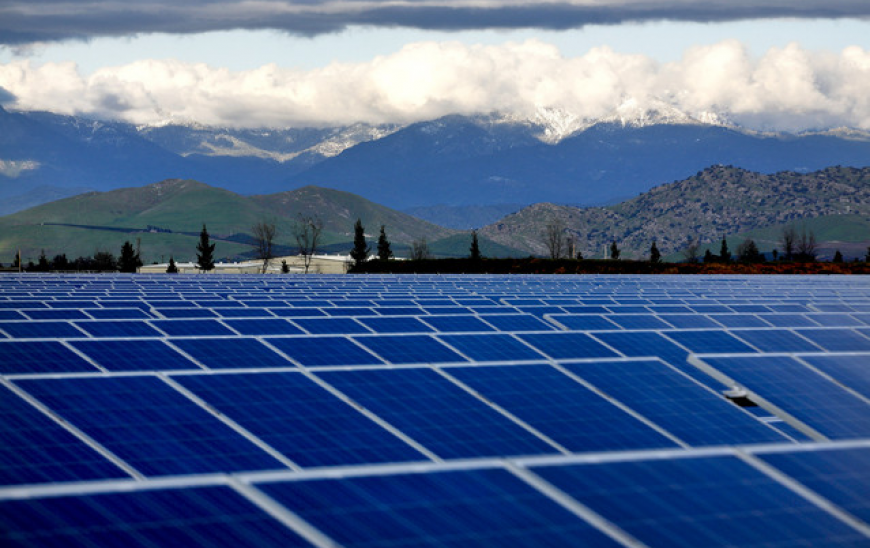The Stanford School of Earth, Energy & Environmental Sciences is now part of the Stanford Doerr School of Sustainability.
This page is currently being maintained for archival purposes only. For the latest information, please visit us here.
The Alternative Energy Future
Stanford authors examine the scope of the transition to a clean energy future.
January 16, 2013

The American Academy of Arts & Sciences (AAAS) recently published in its journal, Daedalus, essays by Dean Pamela Matson and Professor Lynn Orr of the School of Earth Sciences, and Jon Krosnick, communications and political science professor, among others. The essays address our Alternative Energy Future, exploring how the social sciences can help overcome obstacles to the adoption of clean energy.
“Energy in the Context of Sustainability,” by Rosina Bierbaum and Pamela Matson. Today and in coming decades, the world faces the challenge of meeting the needs of a still-growing human population sustainably – that is, without affecting the ability of future generations to meet their needs. Energy plays a pivotal role in this challenge, because of its importance to economic development, and because of the myriad interactions and influences energy has on other critical sustainability issues. The authors explore some of the direct interactions between energy and other things people need, such as food, water, fuel and clean air, as well as indirect interactions with climate, ecosystems and the habitability of the planet. They discuss some of the challenges and potential unintended consequences associated with a transition to clean, affordable energy, as well as opportunities that make sense for energy and other sustainability goals. Pursuing such opportunities is critical for meeting the energy needs of nine billion people and maintaining a planet that supports human life in the near and long term. Rosina Bierbaum is a Professor of Natural Resources and Environmental Policy and former dean at the University of Michigan.
“A Trillion Tons,” by Hal Harvey, Franklin M. Orr Jr. and Clara Vondrich. There is a consensus among scientists that stark dangers await in a world where the global mean temperature rises by more than about 2 degrees Celsius. That threshold corresponds to a collective human carbon emissions “budget” of around 1 trillion tons, of which half has been spent. the authors use a new simulation model to look at strategies to stay within that budget, specifically assessing the impact of improvements in energy efficiency, aggressive deployment of renewables and energy technology innovation. The simulations examine the timing of investments, turnover of capital stock and the effect of learning on costs, among other factors. The results indicate that efficiency, renewables and technology innovation are all required to keep humanity within the trillion-ton budget. Even so, these measures are not by themselves sufficient. Changes in land use and a price on carbon emissions are also needed. Hal Harvey is CEO of Energy Innovation: Policy and Technology LLC and Senior Fellow for Energy and the Environment at the Paulson Institute at the University of Chicago. Clara Vondrich is Director of Leadership Initiatives, Climate Works Foundation.
“Does the American Public Support Legislation to Reduce Greenhouse Gas Emissions?” by Jon Krosnick and Bo MacInnis. Despite efforts by some congressional legislators to pass laws limiting greenhouse gas emissions and reduce the use of fossil fuels, no such laws have yet been adopted. Is this failure to pass new laws attributable to a lack of public desire for such legislation? Data from national surveys support two answers to this question. First, large majorities of Americans have endorsed a variety of policies designed to reduce greenhouse gas emissions; second, policy support has been consistent across years and across scopes and types of policies. Popular policies include fuel economy and energy-efficiency standards, mandated use of renewable sources and limitations on emissions by utilities and by businesses more generally. Support for policies has been price sensitive, and the American public appears to have been willing to pay enough money for these purposes to cover their costs. Consistent with these policy endorsements, surveys show that large majorities of Americans believe that global warming has been happening, that it is attributable to human activity and that future warming will be a threat if unaddressed. Not surprisingly, these beliefs appear to have been important drivers of public support for policies designed to reform energy generation and use. Thus, it seems inappropriate to attribute lack of legislation to lack of public support in these arenas. Bo MacInnisis a visiting scholar in the Department of Communication at Stanford University.
Southern California Edison solar array, Porterville CA (photo by Ken James/Bloomberg)



